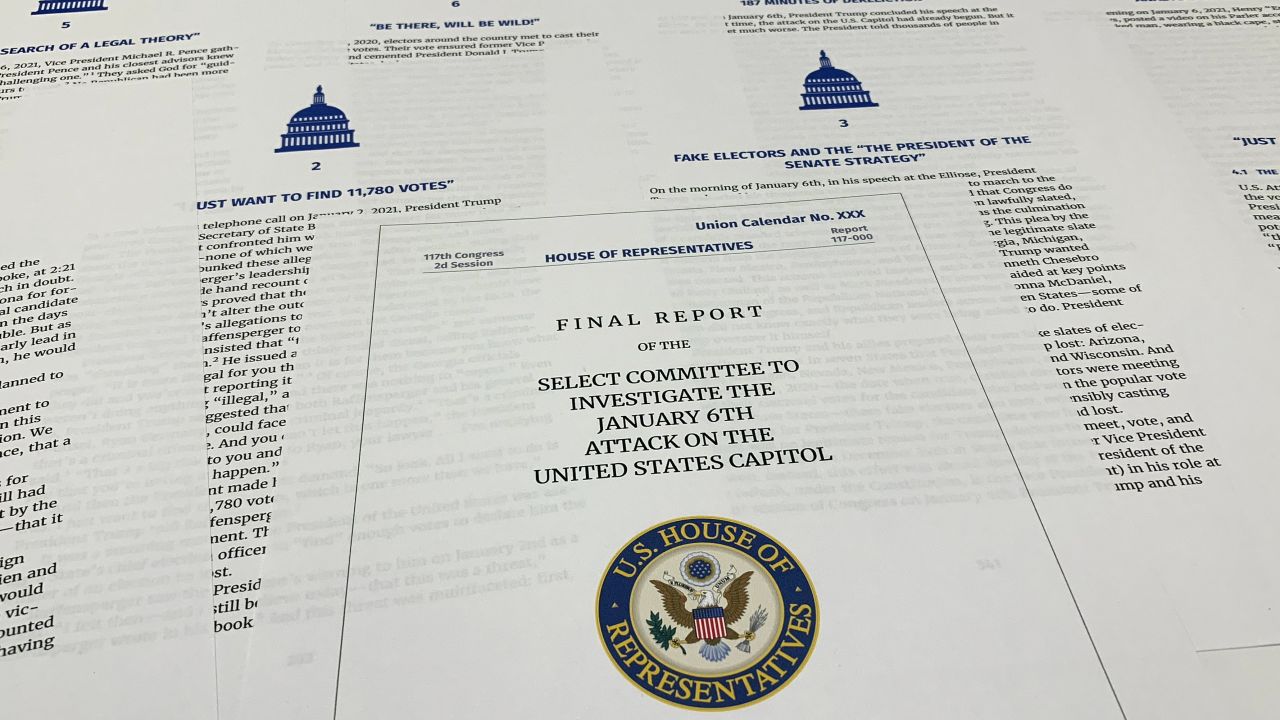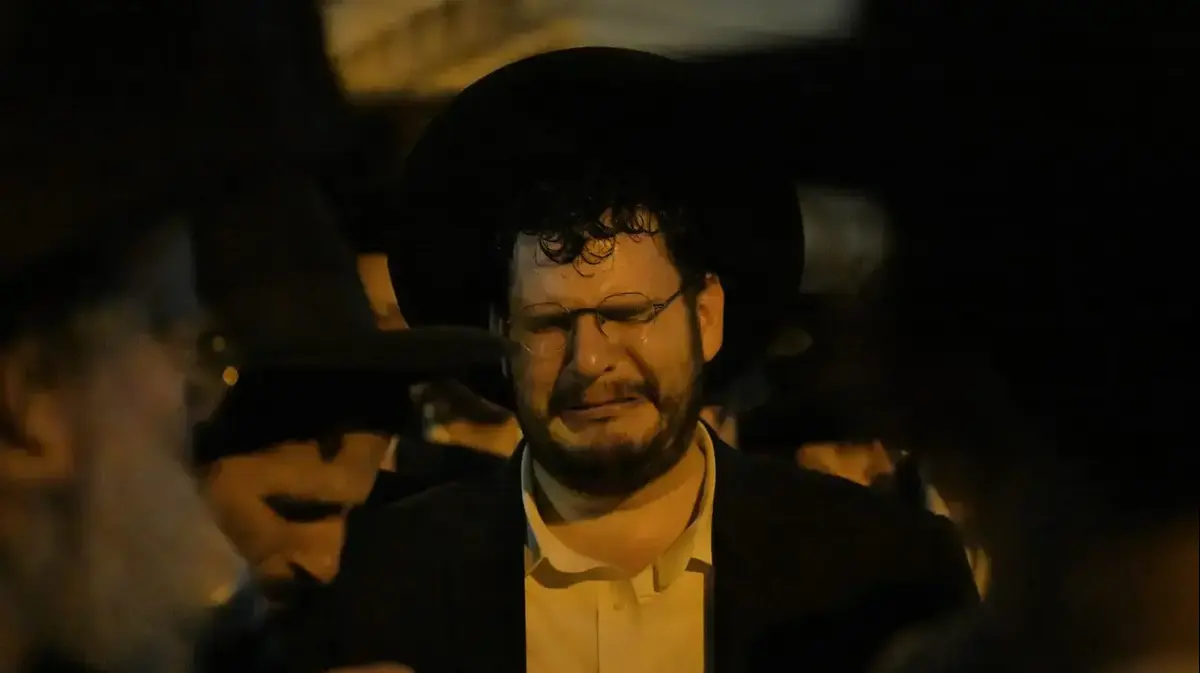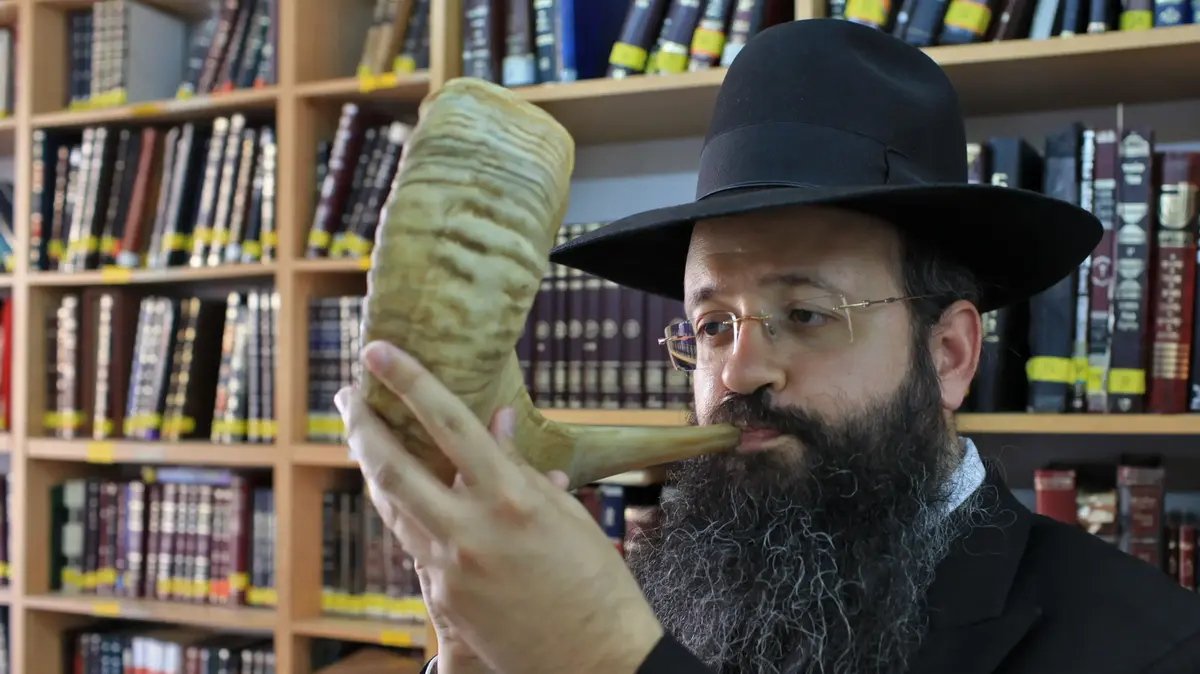Commission of January 6 presents its final report What are the findings?
1:42
(CNN) --
The House select committee investigating the January 6, 2021 storming of the Capitol laid out in more than 800 pages a damning case that former President Donald Trump's efforts to overturn the 2020 election led to the violence at the US Capitol, documenting the actions of the former chief executive for the record and potentially for criminal investigators.
On Monday, the commission referred Trump to the Justice Department on four criminal charges.
This Thursday, he effectively showed his work on why he believes Trump is criminally responsible for his actions.
In its report, the commission recommends that Trump be barred from holding public office again.
Trump quickly lashed out at the report on his Truth Social platform with false claims about the riots and the 2020 election. He did not address the specific conclusions of what he called a "highly partisan" report, instead falsely blaming the president of the House of Representatives Nancy Pelosi of the security breach that day and reiterated her unsubstantiated claims of voter fraud.
These are the key points of the commission's final report:
The commission's full case against Trump
The commission did not mince words to directly blame Trump for the violence on January 6.
advertising
After holding nine public hearings and releasing a summary of the report earlier this week, the final document reads like an indictment against Trump, explaining his direct role in all facets of the plot to overturn the 2020 election, drawing a clear line. dividing line between Trump's electoral denialism and the violence that ensued.
The panel focuses on the section of the Constitution that states that a person who has taken an oath to support the Constitution, but has "participated in an insurrection" or given "aid or comfort to enemies of the Constitution" can be disqualified from office.
The former president and others have been referred by the commission to the Justice Department for collaborating or aiding an insurrection.
The panel asks congressional jurisdiction committees to create a "formal mechanism" to assess whether individuals who violate that section of the 14th Amendment should be barred from future federal or state office.
Despite Trump's attempts to blame Democrats for that day's security lapses and a rebuttal report from the GOP released earlier this week that completely glosses over the former president's own role in the attack, the The select commission's report is an effective conclusion of the panel's 18-month investigation.
ANALYSIS |
Guide to the key week of the commission of January 6
It leaves no doubt that the commission believes that Trump, and only Trump, was responsible for the January 6 attack.
"None of the events of January 6 would have happened without him," the report states.
The report reconstructs an exhaustive narrative
The report published this Thursday by the commission does not contain great news, but rather focuses on the depth and detail of its investigative work.
The report offers the most comprehensive account to date of events in the two months between Election Day on November 3, 2020, and Joe Biden's inauguration on January 20, 2021.
It is a narrative that expands on the commission's public hearings held over the summer, taking readers step-by-step through the various machinations Trump orchestrated and the help he had from allies inside and outside his administration.
Throughout the process, the commission revealed more details about what it had learned in the more than 1,000 witness interviews conducted throughout the 18-month investigation, including details that had not previously been made public, such as the lawyer's call of Trump Eric Herschmann with Rudy Giuliani on the morning of January 6, and that Trump and his inner circle attacked election officials at least 200 times.
It was more than just Trump
The commission's public hearings focused largely on Trump's role, and there were questions in the weeks before the report was released about whether it would go beyond the former president.
But while the main headlines of the report revolved around Trump, the final report also offers a definitive picture of the attack on Congress, the contributing factors within the American discourse, as well as the preparation and failures of security forces.
Trump Expresses Support for Rioters on Capitol Hill While Still Embracing Extremist Groups
The report puts together intelligence assessments prior to Jan. 6 from the federal government, including key messages law enforcement had seen among Trump supporters in online forums.
The commission also interviewed heads of agencies leading the law enforcement response, including Washington Mayor Muriel Bowser and police chiefs.
The select commission also says it interviewed 24 witnesses and reviewed 37,000 pages of documents for a review of the Washington National Guard's response, which attempts to explain the delay in the force's response to Capitol Hill.
The commission learned, for example, that the commander of the Washington National Guard, Major General William Walker, "seriously" considered deploying troops to the Capitol on the afternoon of January 6 without the approval of his superiors, even if it meant that he would have to resign the next day.
No corroboration of the fight in the SUV
The commission was unable to corroborate a secondhand account by former Trump adviser Cassidy Hutchinson that Trump lunged at his top Secret Service agent while he was in his presidential SUV on January 6 and tried to grab the wheel because he was furious that he was not They took him to the Capitol.
Perhaps in an attempt to move beyond the explosive anecdote itself, the commission emphasized that its goal was to uncover the intent behind Trump's actions in the SUV.
Many witnesses, including Trump's press secretary Kayleigh McEnany and the Secret Service press secretary, have said Trump wanted to go to the Capitol and was angry when told he couldn't.
Both the driver of Trump's SUV and the top Secret Service agent that day, Robert Engel, told the panel that they did not remember the events of that day the way Hutchinson described them.
"Engel did not characterize the exchange in the vehicle the way Hutchinson described the account he heard from (White House Deputy Chief of Staff Tony) Ornato, indicating that he did not recall President Trump making gestures to him," he wrote. the panel.
Engel also told the panel that he did not remember being present when Ornato told the story with Hutchinson in the room.
Accounts of Trump angrily demanding to go to Capitol Hill on January 6 have circulated in the Secret Service for the past year.
Hutchinson testified over the summer that Ornato told him the story while Engel was in the room and did not refute Ornato's account.
The driver of the vehicle testified before the commission that he did not remember seeing what Trump was doing or if there was movement.
However, the driver described Trump as "upbeat and irritated" and testified that Trump said shortly after getting into the vehicle: "I'm the president and I decide where I have to go."
Ornato told the panel that he did not recall communications about the incident in the SUV and was unaware of Trump's anger, the report said.
The commission made it clear in its report that it does not consider Ornato's testimony credible.
The report stresses the importance of documents obtained in legal disputes
The commission's report underscores how the House's successful judicial fights to obtain loose documents, emails and phone records played a significant role in helping the commission flesh out its January 6 narrative.
Some of the most explosive moments of the commission's investigation stemmed from records it obtained, from text messages from former White House Secretary General Mark Meadows and other top aides to emails from conservative lawyer John Eastman about the role of Vice President Mike Pence on January 6.
The commission obtained Eastman's emails after a judge sided with the House in a lawsuit in which the commission charged both Eastman and Trump with a criminal conspiracy to obstruct Congress and defraud the government.
Commission of January 6 recommends filing charges against Trump
The report included some new details from the emails, including how Eastman emailed Trump's aide the day he drafted his memo that falsely claimed Pence could block certification of the election on January 6.
Eastman received a call from White House switchboard shortly thereafter, according to phone records obtained by the commission.
In addition to Eastman, the commission identified a little-known pro-Trump lawyer as the original architect of the failed voter plan.
This Thursday's report is the commission's final word on January 6, but it has not finished publishing documents yet.
In addition to the summary and report released this week, the commission has also begun releasing some of the transcripts of the closed-door depositions, including interviews with numerous witnesses who took Fifth Amendment protection against self-incrimination, as well as Hutchinson's amazing testimony.
In the last days of the commission, more transcripts of other testimonies are expected, which will reveal more and more details in the hours prior to the dissolution of the commission, as expected in the new Congress.
Several parties will be eagerly awaiting its release, including GOP lawmakers and Trump himself, who is still facing legal scrutiny on several fronts related to his role in the January 6 insurrection and efforts to overturn the 2020 election. .
The commission has already begun sharing evidence with the Justice Department and special counsel Jack Smith, CNN reported this week.
-- Annie Grayer contributed to this reporting.
Storming the Capitol Donald Trump





/cloudfront-eu-central-1.images.arcpublishing.com/prisa/AUNC5IJBQJAJZDOTZXRFOLKFXM.JPG)

/cloudfront-eu-central-1.images.arcpublishing.com/prisa/ACVHT3PX6JCUJNS4ST4ZY7FO6I.jpg)







